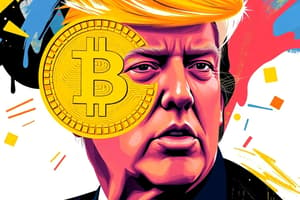Podcast
Questions and Answers
What is the name of the individual who said, " I could either watch it happen or be a part of it"?
What is the name of the individual who said, " I could either watch it happen or be a part of it"?
Elon Musk
What does the term "cryptography" mean in the context of cryptocurrencies?
What does the term "cryptography" mean in the context of cryptocurrencies?
Cryptography is used to secure cryptocurrencies, making counterfeiting or double-spending nearly impossible.
What are altcoins?
What are altcoins?
Altcoins are cryptocurrencies introduced after Bitcoin.
What are the main classes of crypto assets?
What are the main classes of crypto assets?
What is the primary function of Protocol Tokens?
What is the primary function of Protocol Tokens?
What is an ICO?
What is an ICO?
What kind of assets are Security Tokens often backed by?
What kind of assets are Security Tokens often backed by?
Why are Stable Coins important?
Why are Stable Coins important?
Which of the following are examples of Stable Coins?
Which of the following are examples of Stable Coins?
What are the two primary types of NFTs?
What are the two primary types of NFTs?
What is the core purpose of a Smart Contract?
What is the core purpose of a Smart Contract?
What are the key steps involved in a Smart Contract?
What are the key steps involved in a Smart Contract?
What are the major benefits of using Smart Contracts?
What are the major benefits of using Smart Contracts?
What are some potential limitations of Smart Contracts?
What are some potential limitations of Smart Contracts?
What are decentralized applications, or dApps?
What are decentralized applications, or dApps?
What are the defining characteristics of Decentralized Autonomous Organizations (DAOs)?
What are the defining characteristics of Decentralized Autonomous Organizations (DAOs)?
What is Decentralized Identity (DID) Management?
What is Decentralized Identity (DID) Management?
What is a Zero-Knowledge Proof (ZKP)?
What is a Zero-Knowledge Proof (ZKP)?
What are the primary benefits of ZKPs?
What are the primary benefits of ZKPs?
What are the layers of a blockchain?
What are the layers of a blockchain?
What are the three key factors balanced in the Blockchain Trilemma?
What are the three key factors balanced in the Blockchain Trilemma?
What is the goal of scalability in a blockchain?
What is the goal of scalability in a blockchain?
Why is decentralization important in a blockchain?
Why is decentralization important in a blockchain?
What are the key areas where blockchain technology can be applied?
What are the key areas where blockchain technology can be applied?
How does blockchain transform the financial sector?
How does blockchain transform the financial sector?
What are some of the practical use cases of blockchain technology in various industries?
What are some of the practical use cases of blockchain technology in various industries?
Flashcards
Cryptocurrency
Cryptocurrency
A digital or virtual currency secured by cryptography, making it nearly impossible to counterfeit or double-spend.
Bitcoin
Bitcoin
The first cryptocurrency created in 2008, dominating the market with the largest market cap.
Altcoin
Altcoin
Any cryptocurrency created after Bitcoin.
Crypto Asset Class
Crypto Asset Class
Signup and view all the flashcards
Cryptocurrency (Asset Class)
Cryptocurrency (Asset Class)
Signup and view all the flashcards
Protocol Token
Protocol Token
Signup and view all the flashcards
Utility Token
Utility Token
Signup and view all the flashcards
Security Token
Security Token
Signup and view all the flashcards
Stable Coin
Stable Coin
Signup and view all the flashcards
Crypto Collectibles/NFTs
Crypto Collectibles/NFTs
Signup and view all the flashcards
Tokenized NFTs
Tokenized NFTs
Signup and view all the flashcards
Smart Contract
Smart Contract
Signup and view all the flashcards
Smart Contract Steps
Smart Contract Steps
Signup and view all the flashcards
Smart Contract Benefits
Smart Contract Benefits
Signup and view all the flashcards
Smart Contract Limitations
Smart Contract Limitations
Signup and view all the flashcards
Decentralized Application (dApp)
Decentralized Application (dApp)
Signup and view all the flashcards
Decentralized Autonomous Organization (DAO)
Decentralized Autonomous Organization (DAO)
Signup and view all the flashcards
ID Management
ID Management
Signup and view all the flashcards
Decentralized Identity (DID)
Decentralized Identity (DID)
Signup and view all the flashcards
Zero-Knowledge Proof (ZKP)
Zero-Knowledge Proof (ZKP)
Signup and view all the flashcards
ZKP Benefits
ZKP Benefits
Signup and view all the flashcards
Blockchain Layer
Blockchain Layer
Signup and view all the flashcards
Hardware Layer
Hardware Layer
Signup and view all the flashcards
Layer 0
Layer 0
Signup and view all the flashcards
Layer 1
Layer 1
Signup and view all the flashcards
Layer 2
Layer 2
Signup and view all the flashcards
Application Layer
Application Layer
Signup and view all the flashcards
Blockchain Trilemma
Blockchain Trilemma
Signup and view all the flashcards
Scalability
Scalability
Signup and view all the flashcards
Decentralization
Decentralization
Signup and view all the flashcards
Security
Security
Signup and view all the flashcards
Study Notes
Introduction
- Elon Musk stated a preference for being involved in the development of something, rather than just watching it happen.
Definition of Cryptocurrencies
- Cryptocurrencies are defined as digital or virtual currencies secured using cryptography.
- This cryptography makes counterfeiting or double-spending nearly impossible.
Bitcoin vs. Altcoins
- Bitcoin was the first cryptocurrency, created in 2008.
- It currently dominates the market with the largest market capitalization.
- Altcoins are other cryptocurrencies introduced after Bitcoin.
Crypto Asset Classes
- Crypto assets are cryptographically secured digital representations of value or contractual rights, often using distributed ledger technology.
- These assets can be transferred, stored, or traded electronically.
- Seven main classes exist:
- Cryptocurrencies—like Bitcoin and Litecoin; used for payments.
- Protocol tokens—enable decentralized apps (dApps) on a network.
- Utility tokens—fund projects and are used with dApps (Ethereum).
- Security tokens—represent ownership of underlying assets (e.g., stocks).
- Stablecoins—aim for price stability, often backed by traditional currencies (USDT or USDC).
Crypto Collectibles/NFTs
- Non-Fungible Tokens (NFTs) are unique and indivisible tokens.
- They can be entirely virtual or linked to tangible assets (tokenization).
- Examples of NFTs include digital artwork and virtual land within the Metaverse.
Smart Contracts
- Smart contracts are self-executing programs that automate tasks within an agreement.
- These contracts are trackable and irreversible once complete.
- Key steps in smart contracts are pre-defined conditions, triggered events, execution, and settlement recorded on the blockchain.
Smart Contracts: Benefits and Limitations
- Benefits:
- Trust and transparency due to decentralization.
- Enhanced security through robust encryption.
- Increased accuracy with reduced manual errors.
- Efficiency via automated execution, reducing costs.
- Limitations:
- Mistakes in smart contracts cannot be easily fixed (irreversibility).
- Complexity often requires specialized expertise.
- Legal recognition is not universal in all jurisdictions.
- High execution costs can occur on busy networks for smart contracts.
Decentralized Applications (dApps)
- dApps are software programs that run on blockchains or peer-to-peer networks.
Decentralized Autonomous Organizations (DAOs)
- DAOs are entities without central authorities.
- Smart contracts control voting and decision-making.
- Holders of tokens can directly participate.
ID Management
- Decentralized Identity (DID) management, crucial for smart contracts.
- Allows enhanced self-sovereignty through user control over personal data.
- Facilitates interoperability and reduces fraud through direct verification.
Zero-Knowledge Proofs (ZKPs)
- Zero-knowledge proofs allow parties to verify information without revealing the actual information itself.
- This enhances privacy and reduces the risk of leaks during verification.
Blockchain Layers
- Blockchains are composed of five layers, including hardware for nodes, foundational networks, consensus networks like Bitcoin or Ethereum, scaling solutions, and application layers.
Blockchain Trilemma
- Blockchain faces a trilemma balancing speed, decentralization, and security to satisfy all needs.
Decentralization and Protection
- Decentralization means distributing control among multiple nodes to counter potential attacks.
- It improves the security to protect from potential hacks like 51% attacks.
Use Cases of Blockchain
- Blockchain applications revolutionize industries like supply chains (track goods), healthcare (patient data management), and real estate (asset tokenization).
- Other industries using blockchain include anti-counterfeiting, epidemic tracking, financial management.
Studying That Suits You
Use AI to generate personalized quizzes and flashcards to suit your learning preferences.




